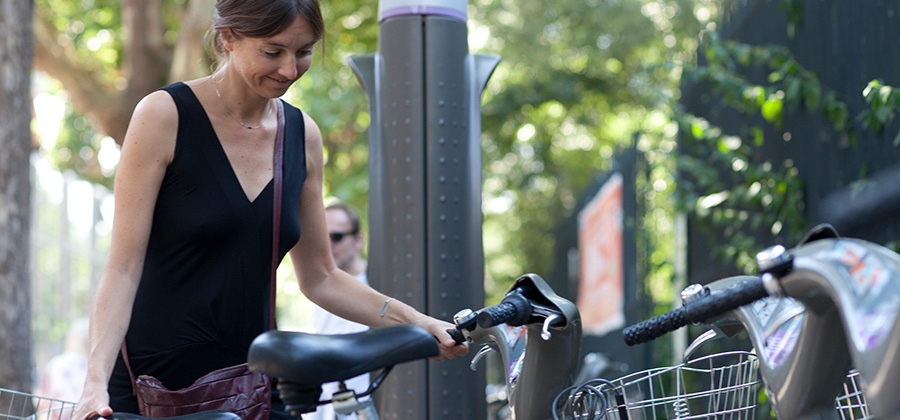Drones will play an essential role in future companies, and the European Commission intends to open new horizons for them by offering a blueprint for their use in low-level airspace.

Since April 2016, a drone pilot licence has been required in Belgium. Professional use nevertheless requires that the pilot take a training course and take piloting tests. Funds were recently made available to ensure that electronic data is shared between pilots and the DGTA (the Belgian Civil Aviation Authority). The new computer system should also speed up licence authorisation procedures. It is part of an ambitious European framework.
"The commercial applications of drones are enormous. Our goal has always been to develop a safe work environment with the existing royal decree. We have always said that we need to keep pace with the sector's technology and vigorous growth."
François Bellot, Belgian Federal Minister of Mobility
What is its purpose?
Aside from recreational use, there are many other industrial and professional areas of use: service provision in urban areas, data collection, infrastructure inspection, agriculture, precision logistics and transport. The drone service market is expected to grow, and estimates vary between 10 billion euros by 2035 and 127 billion euros in the coming years. To mention one example, the size of the drone market will increase by 42% for precision agriculture by 2020.
U-Space over Europe
In Europe, the Commission gave the company SESAR the task of developing the European aerial drone traffic system. On 16 June, the company unveiled U-Space, the blueprint for a low-level airspace drone usage concept. The plan comprises the airspace up to 150 meters in altitude and sets benchmarks for the development of a drone service market in the EU.
"Beyond drones, there is new areas of innovation, new services for citizens, new business models and enormous economic growth potential. We need the EU to be firmly in control and the European drone service market to be safe and operational in 2019. The EU must take charge on a global scale of the development of this adapted framework, which will allow this market to thrive and will open up its potential, benefiting major sectors of the economy."
Violeta Bulc, European Commissioner for Transport.
The " U-Space" plan is organised around three main areas:
- low-altitude safety must be equal to that of classic, on-board pilot aerial operations;
- the system provides information that allows highly automated drones to fly safely and avoid obstacles and collisions;
- in 2019 it will be possible to register drones and their users as well as their electronic identification and their geo-tracked location.
20.12.2024
Mobility in 2025: Arval’s view
Laurent Mélignon, Corporate Sales Director of Arval, the market leader in full-service car leasing and new mobility solutions, looks ahead to 2025. What does the future hold for the industry and mobility?
Arval is part of the Commercial, Personal Banking & Services division of the BNP Paribas Group. As the market leader, it plays a key role in offering full-service car leasing and new mobility solutions. Laurent Mélignon, Corporate Sales Director of Arval, is thus ideally placed to share his thoughts on what's in store for Arval in 2025.
Arval is the market leader in a sector in flux: how companies and private individuals see and approach mobility has changed significantly. Mélignon sees several reasons for this: "In our country, taxation is the primary driver of many change processes. This taxation is linked to wage costs: many companies see company cars as a tax-friendly alternative for maximising the remuneration they want to pay their staff. Employees, meanwhile, see company cars as a way to be compensated with tangible benefits, without the tax authorities targeting them. In the coming year, the tax framework will continue to evolve in line with this social evolution. The federal mobility budget and the bicycle allowance, for example, or options such as the cafeteria plan or the flex income plan: these are just some of the ways in which companies can use their salary package to motivate their workers."
But Arval's Corporate Sales Director sees even more drivers of change for mobility. Mélignon: "Our entire mobility culture is also changing, a trend that is set to continue in 2025. The younger generation is much less attached to the status that company cars have been associated with for so many years. They are just as happy to hop on a bicycle, take the bus or use car sharing, depending on the company's location, of course. Finally, there are also several macroeconomic factors driving this change. These include the growing traffic crisis many cities are facing, as well as the increasing awareness of people and economic players regarding the energy transition. We are all gradually seeing the need for change and alternative mobility choices. This has been clear for quite some time."
Flexible complexity
The mobility mix will only become stronger in the future. Mélignon: "That is a big part of our mission: to be and remain a one-stop shop, offering companies the opportunity to think in terms of flexible remuneration. A new employee, for example, someone who is single and without a family, has different mobility needs than their colleague, who is married with two children and has their own home in the countryside or in the city. Now that this need is becoming stronger and more established, Arval is the ideal partner to provide companies with knowledge about mobility and take the burden off their hands. We enable employers to offer flexibility by taking care of the complexity associated with it."
Positive mindset
Mélignon expects the transition to electric mobility to continue in 2025: "When I look at corporate customers, I see that 80% of all new orders are electric. This is quite different from the private market, where we barely reach 20%. The electrification of the Belgian fleet is therefore mainly driven by companies. I see that the government has recently made some announcements and initiatives to slightly adjust and refine the federal mobility budget. In the coming months, more and more people may thus give up their company cars and opt for this adjusted budget instead. Arval can also be of service there, with a positive mindset and a lot of know-how, in our role as a 'full mobility provider'."
Tipping point
According to Mélignon, the shift to electric mobility, which the market has been anticipating for so long, will also have consequences for companies. Mélignon: "We expect to see many more affordable models in 2025. Electric vehicles will no longer be just for the lucky few. This benefits the private market, but it also gives companies more opportunities. In addition, I expect the price of cars with combustion engines to rise. We often receive this feedback from manufacturers. As a result of the Corporate Average Fuel Economy (CAFE) standards, which regulate their CO2 emissions, they will soon have to pay huge fines if they fail to meet these standards. It is therefore in their interest to steer the market towards electric cars. They will also adjust their production capacity accordingly: 'made to order' instead of holding large stocks will become the industry standard from next year."
The road ahead
On a final note, Arval expects the market to open up to smaller and medium-sized enterprises and individual clients in the near future. Mélignon: "We believe that the change in the market will mean that many companies, which currently still favour purchasing company cars or financial leasing, will switch to operational leasing. They will outsource the risk related to, for example, residual value to us. And that is where we can make a difference as the market leader: we see this as a scenario for the near future, for which we are already preparing."
11.09.2024
Discover our leasing options and get our top deal
Thinking about leasing a company car? Not sure which options are available? Below is an overview of all our available leasing options. That way you can determine which type of leasing is right for you. What's more, our partner Arval has a top deal, valid until 30 November 2024: drive the new electric BMW iX1 eDrive20 or BMW i4 Gran Coupé for a very advantageous all-in price.

Financial or operational leasing?
The same reasoning applies to both financial and operational leasing: you pay a leasing company for a specific period, usually four or five years. In both cases, the leasing company is the legal owner of the car. You do, however, have the option to purchase the car at the end of the contract. In financial leasing, the amount of the purchase option is known from the start of the contract whereas with operational leasing, the amount is determined at the end of the contract based on the car's market value.
'Including services'
This is one of the major advantages of operational leasing versus financial leasing: the taxes, (comprehensive) insurance, maintenance and costs (except fuel) are all included in the rental price. What's more, you enjoy additional services such as summer and winter tyres, roadside assistance and a replacement vehicle. All you need to do is pay a specific amount each month and that's it. In short, you get to drive with peace of mind: everything has been paid for, except for the fuel.
Tax implications?
The purchase option has tax implications: for a financial lease, you depreciate the investment asset and deduct the interest on your tax return. The car is listed as an asset on your balance sheet. For an operational leasing contract, the full rental price is processed as a cost. Tax deduction limits apply in both cases and you may have to take the professional use of the car into account. Equally important: the VAT is paid monthly on the rental price and not in one go, allowing you to use your lines of credit for other investments.
Get our top deal
Our exceptional offer is valid until 30 November 2024: you can lease the new electric BMW iX1 eDrive20 or BMW i4 Gran Coupé under an operational leasing contract at an affordable and exclusive price, including all services.
Arval Belgium SA, Ikaroslaan 99, 1930 Zaventem – RPM Bruxelles – TVA BE 0436.781.102, intermédiaire en assurances à titre accessoire, inscrit auprès de la FSMA sous le numéro 047238 A. Sous réserve d’acceptation de votre demande.
Arval Belgium nv, Ikaroslaan 99, 1930 Zaventem – RPR Brussel – BTW BE 0436.781.102, nevenverzekeringstussenpersoon geregistreerd bij de FSMA onder het nummer 047238 A. Onder voorbehoud van aanvaarding van uw aanvraag.
22.06.2023
Shipping: focus on the impact of decarbonisation and energy transition
At the end of May, BNP Paribas Fortis and the University of Antwerp brought together a number of experts to discuss the many challenges involved in decarbonising the shipping sector. What are the key points to remember?
Established 12 years ago, the BNP Paribas Fortis Chair in Transport, Logistics and Ports - linked to the University of Antwerp - conducts in-depth research to find concrete and innovative ways of creating an increasingly resilient – and sustainable – maritime ecosystem.
Building on the success of its first two major events in 2017 and 2019, the Chair has decided to do it again this year. On 25 May 2023, a number of experts and stakeholders from the port and maritime transport sector gathered at the BNP Paribas Fortis premises in Antwerp to discuss the impact of decarbonisation on the maritime ecosystem.
Here are their main findings...
1 – We need to move up a gear
Shipping is currently the most carbon-efficient form of commercial transport in terms of CO₂ emissions per tonne and kilometre. But it can do better.
So far, industry players have favoured quick wins, such as modifying ship propellers and adjusting speeds. But on 25 May, the experts agreed that now is the time to experiment with new fuels and technologies, and move towards (near) zero emissions. The pace of change is accelerating, but there's no silver bullet yet. The costs (and risks) are huge.
2 – International regulation, please (and only one)!
The regulatory framework is complex and constantly evolving.
The International Maritime Organisation (IMO), which reports to the UN, is committed to reducing the carbon emissions from all ships by 40% by 2030 and by 70% by 2050 compared to 2008.
The European Union has committed to reducing greenhouse gas emissions from shipping by at least 55% by 2030, compared to 1990 levels. By 2024, an Emissions Trading Scheme (ETS) will apply to all ships of more than 5,000 gross tonnes sailing to or from EU ports.
In short: things are moving, and in the right direction. The problem, according to industry players, is that numerous regional and supra-regional programmes continue to coexist. This leads to administrative and financial overload.
On 25 May, all those involved agreed on two points: firstly, that a single international policy is essential, as this is a global sector; and secondly, that players who do not comply with the rules must be sanctioned.
3 – The transition to carbon neutrality will be costly
The investments required to build new greener ships is estimated at $5 trillion by 2050. The cost of modernising the existing fleet is not yet known, but it will not be zero. In addition, the investment required to renew port infrastructures promises to be huge.
4 – Fuel and/or preferred technology: uncertainty reigns
What will be the fuel or technology of the future? Opinions are divided.
Many types of low-emission fuels are likely to coexist for some time. Electricity will only be used on coastal vessels, ferries and some tugs. Large ships will use liquefied natural gas (LNG) or liquefied petroleum gas (LPG), methanol, ammonia and possibly even biofuels.
Long-distance shipping will initially depend on heavy fuel oil, possibly with carbon capture and storage. Hydrogen has potential, but its density, storage and handling raise questions. Wind, solar and nuclear power are also in the mix.
But the real problem at the moment is that while the number of ships that can run on cleaner fuels is increasing, these fuels are not yet sufficiently available internationally. In other words, supply is much lower than demand.
5 – Banks play a key role
Banks have a key role to play in financing the energy transition. In 2019, eleven financial institutions – mostly European, including the BNP Paribas Group – launched the Poseidon Principles to support the transition to low-carbon shipping. This global framework makes it possible to measure and disclose the carbon intensity of bank loans in the maritime sector. There are now 24 signatories, including Japanese financial institutions. And that’s good news.
Want to know more?
Presentations, videos and photos from the 25 May event are available on this page.
10.02.2021
What is the future for mobility post-coronavirus?
The health and economic crisis has affected all aspects of every sector. Among them, mobility, for both private individuals and for companies.

Mobility is evolving every day. And it has been driven further as a result of the coronavirus crisis. Many people have been locked down and working from home has been widespread in many parts of the world.
The coronavirus crisis has changed concerns about transport
We are no longer moving around in the same way. And concerns are no longer the same. According to a BCG Consulting report, social distancing and vehicle cleanliness are the most important aspects for 41% and 39% of respondents, respectively, when choosing a mode of transport. There is also pre- and post-Covid mobility, with respondents being more likely to choose walking, their own bicycle or scooter, or their car than before the crisis.
Sustainable and alternative mobility in the years to come
Mobility has not necessarily waited for the coronavirus crisis in order to evolve. And, according to the same report, the share of more environmentally-friendly vehicles will continue to increase. By 2035, more than 35% of new vehicles will be electric cars, becoming the predominant form of motorised transport worldwide. Autonomous cars will also become more common, with 10% of vehicles being level 4 vehicles (able to travel without a driver, for example), and 65% level 2 or higher.
Customised mobility for employees, right now
The future of mobility is also relevant now, especially for businesses and the self-employed. The need for alternative modes of transport does not only concern private individuals, but also employees. There is no longer a single mode of transport for all situations, but a range of means depending on the need at a given moment. Electric cars, hybrid vehicles, electric bicycles, a public transport season ticket, car sharing, leasing, etc. These modes can take different forms and be combined in a mobility card, for example. There are benefits for the employees and managers of a company but also for the company itself through cost reduction, optimisation and fleet management.
Find out more about our tailor-made mobility solutions
